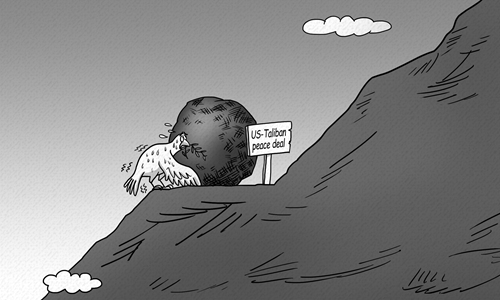HOME >> OPINION
Afghan peace deal unlikely to end terrorism threat
By Bingjie Becky Shen Source:Global Times Published: 2020/3/12 22:48:13

Illustration: Liu Rui/GT
The US launched an airstrike on the Taliban forces on March 4, just days after the two sides signed a peace deal. According to US military spokesperson Colonel Sonny Leggett, the attack was "defensive" as it was to counter the Taliban's assault on Afghan government forces in Nahr-e Saraj.US Secretary of State Mike Pompeo said on March 5, that Taliban fighters had launched over 70 attacks on Afghan government forces since the deal was signed.
While many question whether both sides are committed to the deal, and whether the resumption of fighting would throw a spanner in the works, it should come as no surprise that the Taliban has failed to keep the assurances they made.
On Tuesday, NBC News reported several US officials' accounts of intelligence suggesting the Taliban will not abide by the peace deal. The Taliban has continued to use violence and harbor terrorist groups since the preliminary rounds of talks last January.
Data from Long War Journal, a project of the Foundation for Defense of Democracies, indicate that not only did the Taliban use violence to pressure both the Afghan government and the US, they allowed Afghanistan to be a sanctuary for supporters and perpetrators of international terrorism. Al Qaeda has been found to ally with other regional terrorist groups including the Turkistan Islamic Party (TIP), the Islamic Jihad Union (IJU), the Islamic Movement of Uzbekistan (IMU), and more. As a result, some contend the Taliban must dissociate itself from Al Qaeda, if it wants to prevent Afghanistan from remaining a terrorist sanctuary.
There are different narratives that explain the relationship between Al Qaeda and the Taliban. Some argue that the Taliban needs Al Qaeda for ideological, operational, and strategic reasons, suggesting ties between the two groups will be difficult to break. But other observers challenged the dominant views by highlighting the tensions the two groups when Al Qaeda's sole pursuit of transnational jihad using extreme violence led to the destruction of the Taliban regime.
The Al Qaeda problem, however, is only a part of the terrorism landscape in Afghanistan and the wider Central and South Asian region. Whether the Taliban cuts ties with Al Qaeda hardly indicates any increased level of momentum in Afghanistan's peace process. Military forces against terrorism has not been effective during the 18-year war. The Obama administration intensified the use of Predator drones in eliminating leadership figures and low level operatives of Al Qaeda, extending drone operations from Afghanistan to Pakistan. Yet the network of terrorists remains and its structure and mobilization capability has been barely challenged. The Taliban doesn't have a snowball's chance in hell of keeping Afghanistan from being a terrorist sanctuary, through the use of force.
Therefore, resolving the international terrorism problem in the Af-Pak region through a holistic approach by all relevant regional stakeholders takes precedence over relying on the Taliban to renounce existing regional terrorist groups such as Al Qaeda. Based on the author's past research and interviews with diplomatic and security figures in the region, the Shanghai Cooperation Organisation (SCO) is generally recognized as a good starting point to tackle mistrust at bilateral levels and put forward regional cooperation. Yet much remains to be done before security management mechanisms turn into security governance mechanisms as national interests differ despite the common goal of bringing peace to Afghanistan.
Increased security under a regional framework contributes to peace but does not equal peace. The intra-Afghan talks remain the core. Premised by no presence of foreign forces in Afghanistan, further steps of peace efforts should occur on both local and national levels with the Afghan government and Afghan people participating fully in negotiating a political solution, though the fight for equal rights and proportional political representation would be draining.
The peace deal between the Taliban and the US barely means peace in Afghanistan as the Taliban is trapped in the regional terrorism challenge, limiting their ability to honor the promises in the deal assuming they intend to. Regional counter-terrorism mechanisms such as those under the SCO should engage more with the Afghan problem and evolve faster, creating better conditions for the Afghan government and its people. Reportedly some latest defense and intelligence assessments suggest the Taliban will not stop the use of force until the Afghan government agrees with to the swap of prisoners which was part of the signed peace deal. They probably won't stop anyway. The intra-Afghan talk is supposed to take place within weeks. It will probably be delayed.
The author is Academic Staff Director and Research Fellow of Lian An Academy. opinion@globaltimes.com.cn
Posted in: ASIAN REVIEW